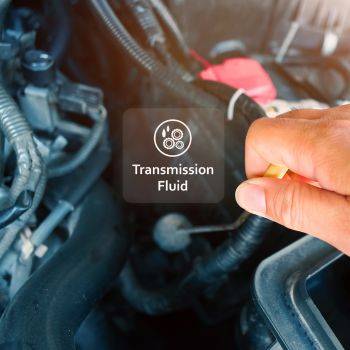Your vehicle's transmission system is responsible for transferring power from the engine to the wheels, ensuring smooth movement. It also manages the power distribution as you speed up or slow down by using a set of gears. The transmission fluid plays a critical role here by providing lubrication to all components and helping to dissipate heat. Whether your vehicle has a manual or automatic transmission, this fluid is essential for both systems. New transmission fluid typically appears pink or red and is somewhat transparent. Over time, however, it can darken or turn milky and opaque. Without enough fluid, your transmission system will struggle to cool down, risking overheating. Additionally, it might not generate adequate hydraulic pressure, which is crucial for automatic transmissions to shift gears properly. A lack of proper fluid also disrupts the relationship between the engine and the transmission, affecting power delivery to the wheels and causing inconsistent shifting. Furthermore, insufficient lubrication leads to increased friction between moving parts, creating wear and tear that can contaminate the fluid with debris. According to most manufacturers, you should change your transmission fluid every 40,000 to 100,000 miles. However, leaks—whether they're from the transmission pan, gaskets, axle, or torque converter—can cause the fluid levels to drop more quickly than expected. While checking the fluid level in your engine reservoir is always a good idea, there are other indicators that your transmission fluid might be running low: Ignoring these signs can lead to complete transmission failure, necessitating costly repairs or even a full rebuild. If you're worried about your transmission system or it's time for a fluid flush, consider booking an appointment with DaSilva’s Auto Body today! Remember, regular maintenance is key to keeping your vehicle running smoothly. Neglecting the transmission system can lead to expensive repairs down the road. Keep an eye on those fluid levels and listen for any unusual noises. Your car will thank you for it! 15L Slush Freezer,Slush Machine,Carbonated Slush Machine,Slush Machine Frozen Drink JIANGMEN PRO-TAYLOR REFRIGERATION CO., LTD. , https://www.protaylor.com Suddenly finding it hard to shift gears smoothly or hearing unusual noises while changing them? These could be signs of low transmission fluid. Let’s explore what this fluid does and other warning signs that indicate it’s running low.
Suddenly finding it hard to shift gears smoothly or hearing unusual noises while changing them? These could be signs of low transmission fluid. Let’s explore what this fluid does and other warning signs that indicate it’s running low.Understanding the Transmission System
Signs of Low Transmission Fluid
Signs of Low Transmission Fluid
